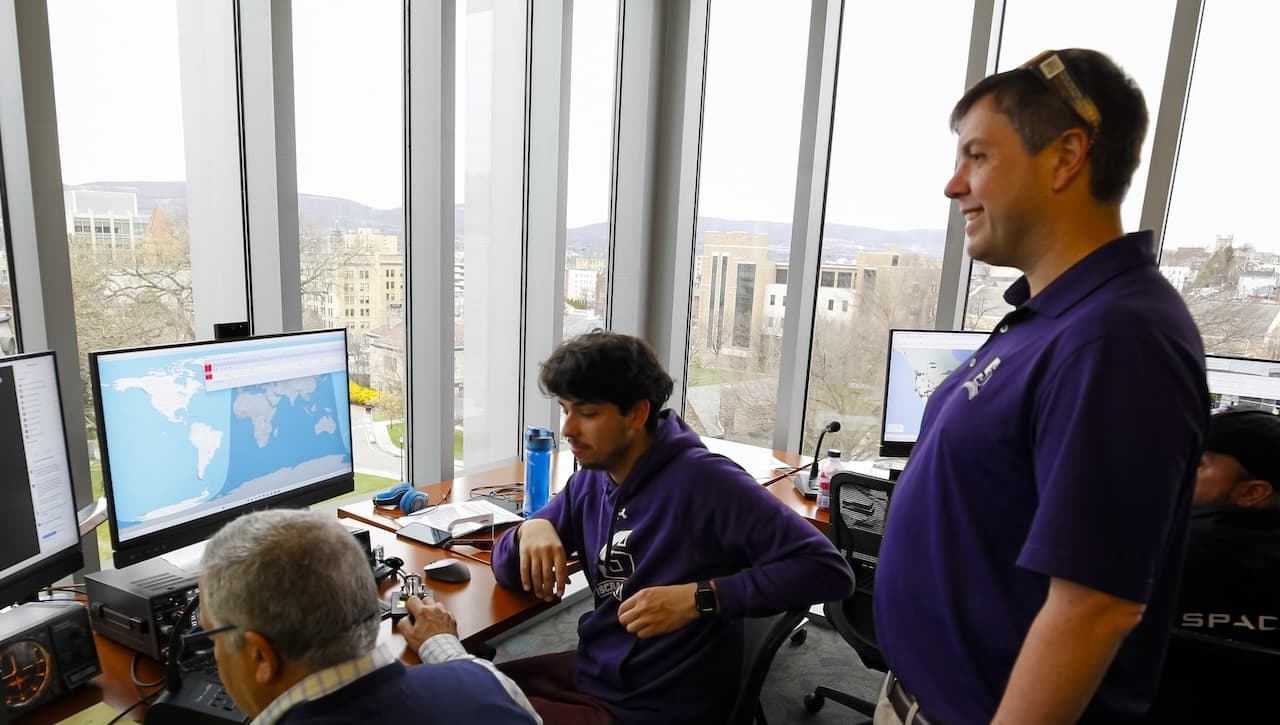Scranton Professor Awarded $1.8 Million NSF Grant

The National Science Foundation (NSF) awarded a $1.8 million collaborative grant to Nathaniel Frissell, Ph.D., associate professor physics and engineering at The University of Scranton, to provide sophisticated atmospheric measuring equipment to a nationwide network of ham radio enthusiast and citizen scientists that he developed. Dr. Frissell will serve as the lead principal investigator of the collaborative grant and will work with colleagues at Case Western Reserve University, the University of Alabama and the New Jersey Institute of Technology.
The grant will further the collective data gathering capabilities of the Ham Radio Science Citizen Investigation project led by Dr. Frissell.
“The grant will establish the only wide-spread, coordinated high frequency, very low frequency and ground magnetometer measurement network that is distributed primarily across the midlatitude region,” said Dr. Frissell.
According to Dr. Frissell, the grant supports the development of a network of 30 standardized receive stations capable of observing high frequency (HF) Doppler shifts, HF amateur radio Weak Signal Propagation Reporter (WSPR, pronounced “whisper”) transmissions, very low frequency (VLF) transmissions and natural radio emissions, and the geomagnetic field.
The enhanced capabilities to collect data on the Earth’s ionosphere for this project builds on the HamSCI Personal Space Weather Station network of licensed amateur radio operators who have helped measure the effects of weather in the upper levels of Earth’s atmosphere through a $1.3 million NSF funded project previously awarded to Dr. Frissell.
According to Dr. Frissell, the new NSF grant will support systems that will be deployed to high-quality, low-noise sites throughout the previously established U.S. personal weather station sites that are most suitable to increasing measurement density and the quality of the current network.
“Priority will be given to locations that can simultaneously and effectively operate all three HF, VLF, and magnetometer instruments,” said Dr. Frissell.
The grant also supports ten fully-automated, Global Positioning System (GPS) disciplined amateur radio WSPRSonde transmitters to serve as a new source of GPS- stabilized high frequency beacon signals.
“These signals will be utilized not only by this project’s personal weather station receivers, but also by the existing global WSPR amateur radio receiver network that provides millions of daily observations,” said Dr. Frissell who explained data collected from all the instruments will be uploaded for HamSCI research. He said the data will also be publicly available.
Collaborators for the project include: Majid Mokhtari, senior laboratory engineer for the Physics and Engineering Department, The University of Scranton; Christian Zorman, Ph.D., associate dean for research, and professor of electrical, computer and systems engineering, Case Western Reserve University; Kristina Collins, Ph.D., research scientist, Space Science Institute; Travis Atkison, Ph.D., associate professor of computer science, University of Alabama; William Engelke, chief architect and engineer of the Personal Space Weather Station (PSWS) project, University of Alabama; Hyomin Kim, Ph.D., assistant professor of physics, New Jersey Institute of Technology; and Gareth Perry, Ph.D., assistant professor of physics New Jersey Institute of Technology; in addition to HamSCI volunteers and collaborators.
A space physicist, Dr. Frissell’s research focuses on the ionosphere, which is an atmospheric region that extends from about 50 to 600 miles above the earth’s surface. According to Dr. Frissell, changes in the ionosphere alter the behavior of radio wave propagation and greatly affect the radio communications and global navigation satellite systems. Understanding ionospheric structures and processes will lead to an increased understanding and prediction of these effects.
Through numerous grants he has received in the past five years from the National Science Foundation (NSF), NASA, the Amateur Radio Digital Communications (ARDC) foundation and other organizations, Dr. Frissell, physics and engineering faculty and students, as well as community volunteers, have been involved in numerous research projects, including one of just five projects selected by NASA’s Citizen Science Investigations to study the effects of the total solar eclipse on the earth’s ionosphere.
Grants have also supported the development of state-of-the-art amateur radio station W3USR on the fifth floor of the Loyola Science Center on campus.
Dr. Frissell joined the faculty at Scranton in 2019. He received his bachelor’s degree from Montclair State University, and his master’s degree and doctorate from Virginia Tech.






